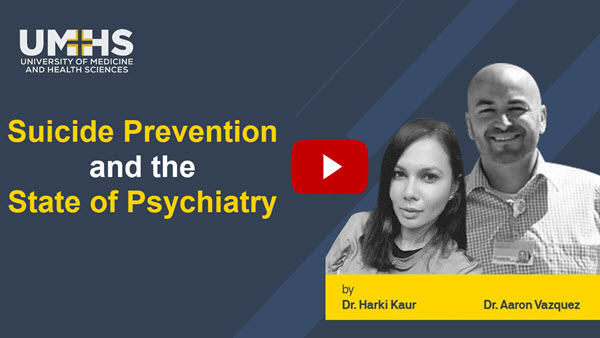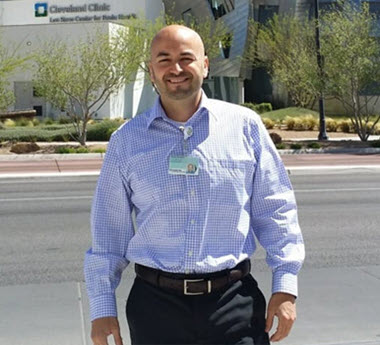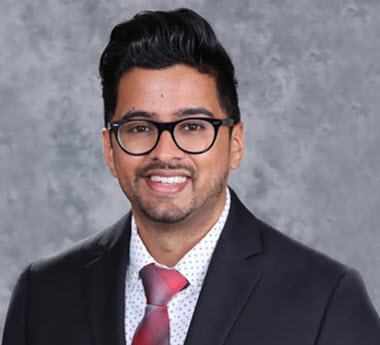 Have you ever wondered how to become a Psychiatrist? As a Medical school, we constantly receive questions about this topic and mental health in general. We know exactly the path to becoming a psychiatrist as we have current students planning a career in Psychiatry, graduates that are currently in Psychiatry residencies, and alumni that are practicing Psychiatrists in the US and Canada. At the bottom of this article, we have included profiles of three graduates of our top offshore medical school that have careers as Psychiatrists. Click on this link to view.
Have you ever wondered how to become a Psychiatrist? As a Medical school, we constantly receive questions about this topic and mental health in general. We know exactly the path to becoming a psychiatrist as we have current students planning a career in Psychiatry, graduates that are currently in Psychiatry residencies, and alumni that are practicing Psychiatrists in the US and Canada. At the bottom of this article, we have included profiles of three graduates of our top offshore medical school that have careers as Psychiatrists. Click on this link to view.
By spending the next 10 minutes with us, you will learn how to become a Psychiatrist and will gain insight into why a student should or should not consider Psychiatry as a career. There are academic and non-academic items that prospective students should consider. In addition, we will provide answers to 8 frequently asked questions about how to become a Psychiatrist and Psychiatry as a career in general including these faqs:
- What is a Psychiatrist?
- What does a Psychiatrist do?
- What is the educational path to become a Psychiatrist?
- How long does it take to become a Psychiatrist?
- Do Psychiatrists go to Medical school?
- What is the difference between a Psychiatrist and a Psychologist?
- What are the subspecialties of Psychiatry?
- Is Psychiatry a good career?
What is a Psychiatrist?
Psychiatrists are board-certified and licensed medical practitioners that are specialists in treating mental health disorders. Psychiatry as a Medical specialty focuses on diagnosing, treating, and preventing mental, behavioral, and emotional disorders. Common psychological problems treated include anxiety, depression, personality disorders, schizophrenia, bipolar disorder, body dysmorphic disorder, eating disorders, and addiction. Psychiatrists also perform laboratory and psychological tests to diagnose patients' disorders. They utilize prescription medications, psychotherapy, and a variety of new treatments including electroconvulsive therapy, deep brain stimulation, and transcranial magnetic stimulation. Psychiatrists may work in both the clinical and hospital setting. In the clinic, psychiatrists perform medication checks and provide counseling to patients. In the hospital, psychiatrists work on the general medical floor or with hospitalized psychiatric patients in a separate secure psychiatric unit.
Discover if a career in Psychiatry is right for you.
Learn why 89% of doctors would choose the same specialty again.
What do Psychiatrists do?
A Psychiatrist is a medical doctor that evaluates symptoms and possible causes of mental health disorders. This can include ordering blood tests, collecting medical histories, and analyzing symptoms to help make a diagnosis. After a medical diagnosis is made, a Psychiatrist may recommend treatments such as prescription medication, light therapy, counseling, diet and lifestyle management, and electroshock therapy. Many times the Psychiatrist may refer and co-manage a patient with a Psychologist. Some common mental conditions in patients that Psychiatrists diagnose and treat include:
- Schizophrenia- a chronic health disorder that is characterized by disorganized speech, odd behavior, decreased participation in daily activities, difficulty concentrating, and delusions.
- Sleeping disorders- this includes insomnia and other sleeping disorders that are characterized by a reduced amount of sleep, poor quality of sleep, inability to fall asleep, and frequent nighttime awakening.
- Depression- a chronic disorder characterized by loss of interest in daily activities, change in appetite, feelings of sadness, decreased self-esteem, lack of social interaction, and loss of motivation.
- Anxiety disorder- a mental health disorder that may include excessive worry, panic attacks, restlessness, and anxiety levels that interfere with daily activities.
- Bipolar disorder- a condition that is characterized by mood swings that include a manic phase with high energy and loss of touch with reality and a depressive phase with low energy and loss of interest in daily life.
- Attention disorders including ADD and ADHD- these are chronic conditions that have symptoms of impulsiveness, hyperactivity, and difficulty maintaining focus and attention.
- Eating disorders including bulimia and anorexia- these disorders are characterized by a distorted body image, excessive thoughts about weight or caloric intake, and an unhealthy relationship with food.
- Psychosis and hallucination disorders- psychosis is a mental disorder characterized by a disconnection from reality. It may also include hallucinations, agitation, incoherence, hostility and being unaware of their odd behavior.
- Addiction disorders– a psychological disorder that is characterized by compulsive engagement in an activity even with negative outcomes or consequences such as substance abuse.

|

|
Psychiatry vs Psychology - What is the difference between a Psychiatrist and Psychologist?
The main difference between a Psychiatrist and a Psychologist is their training background. A Psychiatrist is a licensed Physician that attended Medical school and obtained an MD degree or DO degree, while a Psychologist did not attend medical school and has a PhD psychology degree or PsyD degree and is trained in clinical psychology. Due to their degree program and training background, psychiatrists can practice medicine, prescribe medications, and perform medical procedures while psychologists cannot. Both providers help to take care of patients with mental health disorders and spend time counseling patients and in cognitive types of psychology. Both Psychiatrists and Psychologists are mental health professionals who are trained to understand how the brain works, the diagnostic criteria of various mental health disorders, and treatment modalities for the disorders.
Both also may work in the hospital or in a clinic. While a Psychiatrist may prescribe medications to treat a mental health disorder, Psychologists use psychotherapy (also known as talk therapy) to treat conditions and more often are thought of as a counselor. Psychiatrists and Psychologists often work together to help patients. For example, Psychiatrists may initially see and diagnose a patient and prescribe medications. The Psychiatrist may then refer the patient to a psychologist for talk therapy. Often patients benefit most from seeing both types of providers. Sometimes, both Psychiatrists and psychologists may be referred to as a therapist or even as counselors. This should not be confused with those professionals trained as a social worker.
How to become a Psychiatrist - What is the educational path to become a Psychiatry specialist?
Undergraduate Education- The first step necessary to become a psychiatrist is to complete all of the undergraduate prerequisites for admission into med school. This usually includes completing biology, chemistry, and physics courses. Most students obtain a bachelor of science degree, but having a bachelor's degree is not a requirement for most Medical schools, nor is having a pre-med degree.. The Medical College Admission Test (MCAT) must also be completed prior to applying to medical school. Additional steps that may or may not also be required to become a medical student include conducting research, shadowing physicians, volunteering, holding leadership positions, and working in medical environments.
Medical School Education- Once admitted, medical school education is four years long. The first two education years are spent in the classroom attending classes and taking exams on campus. After the first two years a med student will take their first board exam, the USMLE Step 1 (for an MD student) or COMLEX Level 1 (for a DO student). During the last two years of school, students go to teaching hospitals to practice medicine in clinical rotations. During that time, med students take their second board exam, USLME Step 2 or COMLEX Level 2. During the last year of school, medical students rotate and work at hospitals throughout the United States and interview with different residency programs. To be a Psychiatrist and pursue psychiatry training, med students would do audition rotations at hospitals they would like to match into. Students match into residency programs during the last few months of medical school.
Residency- After graduating from school, students officially become a physician and can practice medicine but only with proper supervision. Even though they have finished school and have become a physician, they cannot practice alone until residency and specialty boards are completed. Psychiatry residency lasts four years and allows recently graduated physicians to gain more hands-on training, practice, and education in a specific facet of medicine. During the first year of residency, the final USMLE or COMLEX step 3/level examination is completed. Towards the end of the residency, psychiatry residents will take their psychiatry board examination. Once residency is complete and board examinations are passed, they can obtain board certifications and are able to fully practice medicine on their own. There is always great information that can be found online about the medical specialty of Psychiatry and residencies from the American Psychiatric Association. In addition, a great resource is the American Board of Psychiatry and Neurology ( ABPN ). This includes info about continuing education.
Fellowship- Some residents may decide to pursue more extensive training in one of the nine subspecialties of Psychiatry by applying for a fellowship. Fellowships are not required for licensing, but instead are highly competitive programs that are limited in the number of attendees and reserved for top candidates. The different types of Psychiatry fellowships are discussed below.
How long does it take to become a psychiatrist?
On average it takes 12 years after high school to become a Psychiatrist. This includes 4 years of college, followed by 4 years of medical school and 4 years in a Psychiatry residency program. Many fully trained Psychiatrists then choose to pursue further training by attending a fellowship in one of 9 common subspecialties. Most fellowships last 1 year. Read more about subspecialty training for Psychiatrists in the section below. The path to becoming a Psychiatrist is discussed in more detail in the how to become a Psychiatrist section above.
What are the subspecialties of psychiatry that top residents wanting to be a specialist can pursue?
The Accreditation Council for Graduate Medical Education (ACGME) is the official organization and governing body for determining Psychiatry subspecialties. There are nine recognized areas for sub-specialization practice in Psychiatry. The additional length of time needed to complete each fellowship also varies. The fellowship areas for Psychiatry that Psychiatrists can specialize in and the length of completion include:
- Addiction Medicine – 1 year fellowship
- Addiction Psychiatry – 1 year fellowship
- Brain Injury Rehabilitation Medicine – 1 year fellowship
- Child and Adolescent Psychiatry – 2 year pediatric psychiatrist fellowship
- Consultation-Liaison Psychiatry (also known as psychosomatic medicine) – 1 year fellowship
- Forensic Psychiatry – 1 year fellowship
- Geriatric Psychiatry – 1 year fellowship
- Hospice and Palliative Medicine – 1 year fellowship
- Sleep Medicine – 1 year fellowship

|

|
Does a Psychiatrist go to medical school?
Yes, a Psychiatrist does go to Medical school. To further explain, a prospective student, wanting to pursue a career as a Psychiatrist must first complete high school (or a GED) and undergraduate courses, followed by medical school. Most medical school programs last four years. After graduating from an Allopathic medical school (Doctor of Medicine - MD degree) or Osteopathic medical school (DO degree), medical students must successfully complete a residency in general Psychiatry to obtain the credentials needed to get a license and become fully board certified. More information about the path to become a Psychiatrist may be found here.
Where does a Psychiatrist work?
Psychiatrists treat mental health disorders and can work in several different environments including the inpatient at a hospital and outpatient medical clinics. In the hospital, Psychiatrists meet with hospitalized patients where they can diagnose medical diseases or disorders, start a new prescription, change prescription medications, order and interpret laboratory tests, and counsel patients. In the outpatient clinic setting, Psychiatrists do many of the same things. However, the majority of time spent seeing patients in the outpatient setting consists of counseling patients and managing medications.
Check out our recent Livestream on Youtube about the State of Psychiatry. Click on the image!
Is Psychiatry a good career?
Psychiatry is considered an excellent career that does not additionally require a PhD. Although the career path to becoming a psychiatrist is lengthy, many consider it well worth the hard work. Psychiatrists generally are able to spend a large amount of time working with patients directly. Additionally, Psychiatrists can both diagnose and treat patients. The ability to directly impact a patient’s life and mental health and see clinical improvement in patients makes the job very rewarding. Additionally, compared to most careers in medicine, psychiatry has a very good lifestyle with less time spent on call plus Monday through Friday working hours.
Is Psychiatry in high demand?
According to the American Bureau of Labor Statistics, the job of a Psychiatrist is expected to grow an astounding 15.8 percent between 2018 and 2028. In this period, it is estimated that 4,500 Psychiatry positions will become available. This growth is almost twice as fast as the average growth of other common occupations, including other medical occupations. Currently, there are an estimated 27,500 Psychiatrists and over the next ten years, the US will need an estimated 4,200 additional med school graduates to become Psychiatrists, leading to a very secure future job market for future Psychiatrists.
Is Psychiatry a stressful job?
Similar to most careers in medicine, Psychiatry can be a stressful job. However, the amount of perceived stress is dependent on many variables such as the patient population, stress level outside of work, amount of hours worked, working environment, etc. Compared to other physician jobs, Psychiatry is thought to be a profession that is one of the least stressful. Additionally, the work-life balance is thought to be superior to many other medical specialties leading to a less stressful job.

|

|
Psychiatrist salary - How much do board-certified Psychiatrists make?
Psychiatrists make a great salary. There are several different sources that report salaries for Psychiatrists. According to the Medscape Physician Compensation Report in 2022, Psychiatrists make an average of $287,000 plus a $33,000 incentive bonus for a total compensation of $320,000. Another source reports Psychiatrist's salary for those in academic medicine (usually at a large teaching hospital). According to AAMC Careers in Medicine, an assistant Psychiatry professor in academic medicine makes an average of $233,321 while an associate/full professor makes an average of $262,353.
Psychiatrist's debt - How much debt do Psychiatrists have?
Psychiatrists and other physicians often incur a large amount of student loan debt in order to obtain their degrees and medical license. According to Educationdata.org, the average physician graduates with $215,900 dollars of debt (excluding other educational debt such as that from premedical education). If premedical education debt is included, the average medical school graduate has a total of $241,600 in student loan debt after obtaining their degree. 76 to 89 percent of medical school graduates have educational student loan debt depending on the source. To put the amount of debt in perspective, the average medical school graduate owes over six times as much as the average college graduate. This large amount of debt should be taken into consideration when thinking about what it takes to become a physician and Psychiatry as a possible career path.
Innovations in Psychiatry
Perhaps the most widespread recent innovation in the psychiatry field is the utilization and popularization of online therapy-termed teletherapy or telepsychiatry to improve mental health. New hybrid online client platforms provide patients with access to licensed therapists and psychiatrists from the comfort of their own homes. This increases the ease of therapy by reducing the social stigma of attending therapy in person while also allowing access to therapy in rural areas where mental health individuals are few and far between.
Other innovations in psychiatry include mobile cell phone mental health applications that can be utilized to track mental health symptoms and set goals for the future. Lastly, new therapies to treat depression such as transcranial magnetic stimulation (TMS) are being studied and utilized in practice. One study found that with TMS, which uses magnetic devices to target portions of the brain that control mood, 47% of patients with treatment-resistant depression had symptom improvement while 30% had their depression completely cured.
Psychiatrist career and Psychiatry as a Profession. What impact did COVID-19 have on doctors in psychiatric specialties and mental health subspecialties?
Since the beginning of 2020, COVID-19 has had a huge impact on jobs nationwide. Physicians and other healthcare-related jobs are no exception. Overall, medical practices in the U.S. report a fifty-five percent decrease in revenue and a sixty percent decrease in average patient volume since the beginning of the COVID-19 crisis. Due to this drastic decrease in revenue, medical practices and hospitals have furloughed and laid off employees including 43,000 healthcare workers in March 2020 alone. Nine percent of independent medical practices state they have at least temporarily closed their practices. As social distancing guidelines remain in effect, remote patient engagement has soared and increased an astounding two hundred twenty-five percent. During this period of time, most medical schools used online education for basic sciences courses.
One of the most critical specialties has been psychiatry during the COVID-19 pandemic, as stress can peak due to the economic recession, continued isolation, and many other factors. Similar to many other medical professions, psychiatry has rapidly adapted to the pandemic by utilizing telehealth whenever possible. A rise in the use of online or virtual therapy has also occurred. According to a study published in the journal Psychiatry Research, while telehealth is helpful there are still many barriers to providing adequate mental health care. This includes fear of initiating new medications or practices without an in-person consultation and loss of access to medical care for patients without the means to have a virtual psychiatric visit. Another barrier was restrictions to prescribing certain medications electronically. While some states in the US have temporarily loosened restrictions, many problems still remain. Psychiatric services will continue to be needed, perhaps with increasing demand, as people suffer the mental consequences of having lived through the experience of a pandemic.
Profiles and interviews with UMHS students and alumni that have chosen Psychiatry as a career
Want to read more about Psychiatry? You can find out how to become a Psychiatrist by checking out these recent blogs where Scott Harrah has interviewed UMHS graduates. They were kind enough to have taken the time to share their thoughts about why they chose to become Psychiatrists and how the University of Medicine and Health Sciences helped prepare them for a rewarding career in mental health.
How to become a Psychiatrist

Callie Torres is a resident physician working at a top tier institute in the Midwest. She is a freelance health and medical writer as well as an author of many peer reviewed medical articles. She additionally serves as a Captain in the United States Air Force.





















